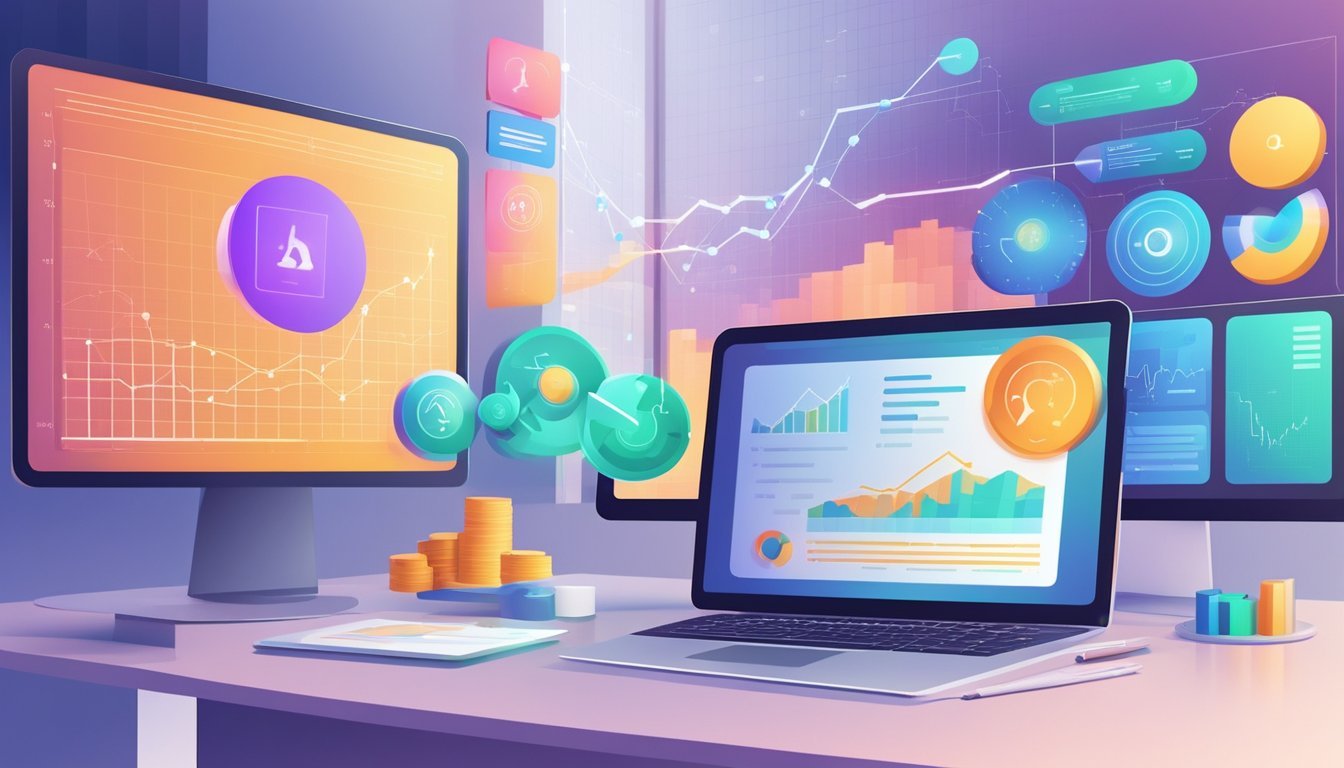AI's Revolutionary Impact on Healthcare & Finance Industries
Artificial intelligence (AI) is significantly altering the landscape of various industries, with its ripple effects changing how businesses operate and deliver services. In healthcare, AI technologies are enhancing patient outcomes and transforming care delivery, leading to increased efficiency and access to healthcare services. By analyzing vast amounts of data and recognizing patterns, AI is enabling medical professionals to make more informed decisions, thus potentially revolutionizing patient care and management.
In the financial sector, AI's influence is equally profound, offering transformative solutions that are reshaping the industry. Financial institutions are leveraging AI for a multitude of applications, from risk assessment and fraud detection to personalized customer service. AI-driven algorithms help in processing complex financial data, offering insights that assist in strategic decision-making and operational optimization. This technology has also introduced a new era of robo-advisors, giving clients sophisticated, data-driven investment advice at a fraction of the cost of traditional financial advisors.
The Impact of AI on Healthcare
Artificial intelligence is revolutionizing the healthcare industry by enhancing the efficiency and accuracy of diagnosis and treatment, offering profound insights through health data analytics, providing tailored patient care, accelerating drug discovery and development, and improving the training of the healthcare workforce.
Improving Diagnosis and Treatment
AI technologies apply machine learning algorithms to improve diagnostic accuracy, often outperforming traditional methods in detecting diseases such as cancer. For instance, AI-powered imaging tools are now able to identify and delineate tumor cells with remarkable precision, leading to earlier and more effective treatments. Hospitals adopting AI-driven diagnostic systems report significant enhancements in patient outcomes.
Health Data Analytics and Insights
Healthcare providers are leveraging AI to transform structured data and unstructured health data into actionable insights. Predictive analytics tools can now forecast disease outbreaks and patient admissions rates, enabling hospitals to better allocate resources. Moreover, Natural Language Processing (NLP) empowers practitioners to draw insights from vast arrays of medical literature and patient records, thus refining decision-making processes.
Patient Care and Personalized Medicine
The shift towards personalized medicine is bolstered by AI platforms that analyze genomics and patient data to tailor treatment plans. This personalization extends to wearable medical devices and healthcare apps, which use AI to monitor patient health in real-time and adjust medical interventions accordingly. This technology fosters a collaborative approach between patients and providers, focusing on individual patient care.
Drug Discovery and Development
In drug research, AI significantly cuts down the time and cost by identifying potential drug candidates and predicting their effects. Using deep learning, AI can simulate the drug interactions at a molecular level, a process that Microsoft has contributed to with its AI platform, driving forward the pace of drug discovery and bringing novel treatments to clinical practice sooner.
Healthcare Workforce and Training
AI not only augments the productivity of healthcare professionals but also reshapes their training. By automating routine tasks like claims processing, it allows practitioners to focus on more complex aspects of patient care. Furthermore, AI-driven simulations create dynamic training environments for healthcare providers, ensuring they remain adept at the latest clinical advancements and compliance requirements.
AI-driven technology is making strides in transforming healthcare through enhanced efficiency and accuracy across various functions, from predictive patient care to the automation of administrative tasks. The promising collaboration between AI tools and healthcare workers is setting the stage for a more responsive and effective healthcare industry.
AI in Finance and Banking
Artificial Intelligence (AI) is revolutionizing the finance and banking sectors by enhancing efficiency, ensuring compliance, and providing superior decision-making capabilities. Banks and financial institutions leverage AI tools, including machine learning algorithms and data analytics, to gain insights into customer behavior, streamline operations, and manage risk more effectively.
Automating Processes and Compliance
Automation in banking and finance primarily focuses on reducing manual effort and enhancing accuracy. Machine learning models, capable of processing structured data, are instrumental in automating routine tasks such as document verification and report generation. These AI tools also ensure adherence to regulatory approaches and laws by automatically updating systems in line with changing regulations, thereby mitigating risks associated with non-compliance.
Enhancing Decision Making in Finance
In finance, AI-driven analytics play a pivotal role in shaping decision-making. By analyzing vast amounts of data, AI provides actionable insights that businesses can use to optimize their finance function and refine their investment strategies. Predictive analytics, for instance, forecasts future trends and assists in the strategic planning of the financial pipeline to maximize revenue.
Risk Management and Investment
Risk management is another area where AI significantly contributes by identifying potential risks through pattern recognition. AI systems assess market conditions and predict shifts with a high degree of accuracy, thus informing investment decisions. In banking, AI automates credit scoring processes, allowing for a more nuanced understanding of a customer's creditworthiness, and, in turn, influences the finance value chain.
Customer Experience and Retention
Lastly, AI enhances the customer experience by personalizing financial services. Conversational AI, such as chatbots powered by OpenAI, provides instant assistance to banking customers, while AI-driven recommendation systems offer personalized investment options. Through these interactive channels, financial institutions can foster stronger relationships, improving customer retention and satisfaction.
AI Transformations in Other Industries
Artificial Intelligence (AI) is reshaping various sectors by enhancing efficiency, promoting smarter decision-making, and pioneering innovations that redefine business operations.
Manufacturing and Supply Chain Optimization
In manufacturing, AI-driven automation increases productivity by overseeing complicated assembly lines with precision and speed. Machine learning algorithms learn from vast datasets to optimize supply chain logistics, leading to the adoption of smart factories. For instance, AI tools in manufacturing monitor equipment health, predict maintenance needs, and ensure minimal downtime. This has become a key area for investment as businesses strive to maintain a competitive edge.
Retail and User Experience
Retailers are leveraging AI for personalized customer experiences through data analytics and tailored recommendations. AI technologies enhance the user experience by analyzing purchasing behavior and modifying offerings accordingly. They also manage inventory through predictive analytics, ensuring optimum stock levels. Additionally, chatbots powered by AI handle customer service inquiries, providing timely and accurate responses, which contribute to customer satisfaction and retention.
Education and Continuous Learning
Education industries are experiencing a transformation through AI-enabled personalized learning experiences and continuous learning platforms. AI assists in the creation of adaptive learning paths for students, catering to individual pace and learning preferences. It's also present in the development of tools that provide real-time feedback to learners and educators. Furthermore, the introduction of AI in education has opened up avenues for large-scale training programs, making learning more accessible and efficient.
Government and Public Sector Innovations
Governments are applying AI to improve public services and collaboration between various entities. In the public sector, AI aids in the analysis of complex data sets to improve decision-making efficiency, urban planning, and resource allocation. By adopting AI, governments can enhance data security measures, develop smarter city infrastructure, and implement IoT for better connectivity and information dissemination. The multidisciplinary team approach is instrumental in formulating policies and strategies that are informed by AI-generated insights.
Advancements and Ethical Considerations
The integration of artificial intelligence (AI) across industries has brought forward a collision of advancement and ethical considerations. Business models are rapidly evolving with AI, but this growth necessitates robust ethical guidelines to safeguard against potential risks such as loss of privacy, accountability concerns, and the need for continuous updating of skills in the workforce.
Ethical AI and Accountability
AI development must maintain a commitment to ethics. Accountability in AI systems ensures they operate fairly and do not reinforce biases. Industries are developing tools for explainable AI to mitigate the "black box" nature of machine learning algorithms, offering clarity on how AI reaches its conclusions. Furthermore, collaboration between AI developers and regulatory bodies is crucial for establishing a framework that promotes accountability.
Data Privacy and Security
The proliferation of AI applications increases the risk of data breaches. Protecting personal data is paramount, and industries must implement rigorous data security measures. Regulations such as GDPR have set a precedent for how personal privacy must be guarded, and financial penalties now reinforce the ROI of investing in secure systems.
Continuous Learning and AI Education
The dynamic nature of AI warrants a dedicated approach to continuous learning and education. Industries should invest in training programs to advance human intelligence alongside AI capabilities. This involves not just a commitment to in-house training but also fostering partnerships with academic institutions to promote AI education at all levels. An adaptive regulatory approach will be required to keep pace with the fast-evolving landscape, ensuring that workers are prepared to collaborate with AI and contribute meaningfully to its ethical application.
Looking to the Future
As industries embrace artificial intelligence (AI), the future lies in the balance of evolving AI technologies, society's integration and acceptance, and the reshaping of job markets. Here's how these factors are anticipated to unfold.
Evolving Technologies and AI Research
The trajectory of AI research is steeped in the development of machine learning techniques, including deep learning and natural language processing (NLP). Investment in the AI sector is escalating, particularly in nations like the U.S. and China, where technological dominance is a priority. These advancements promise more sophisticated analytics and the potential to enhance population health and digital health.
Integration and Adoption Across Societies
AI's integration into daily life depends on societal acceptance and collaboration among stakeholders, including individuals, corporations, and governments. With education on AI's benefits, the technology is expected to achieve higher adoption rates. Moreover, aging societies will likely lean on AI for improved healthcare, through tools like real-time data analysis to offer personalized care.
The Future of Jobs and AI's Role
The advent of AI is set to create a paradigm shift in the job market. While automation may displace certain roles, it also carves out new ones that call for human-AI interaction and oversight. Governments and educational institutions are already recalibrating curriculums to prepare the workforce for a future where robots and AI will be ubiquitous in various industries.





